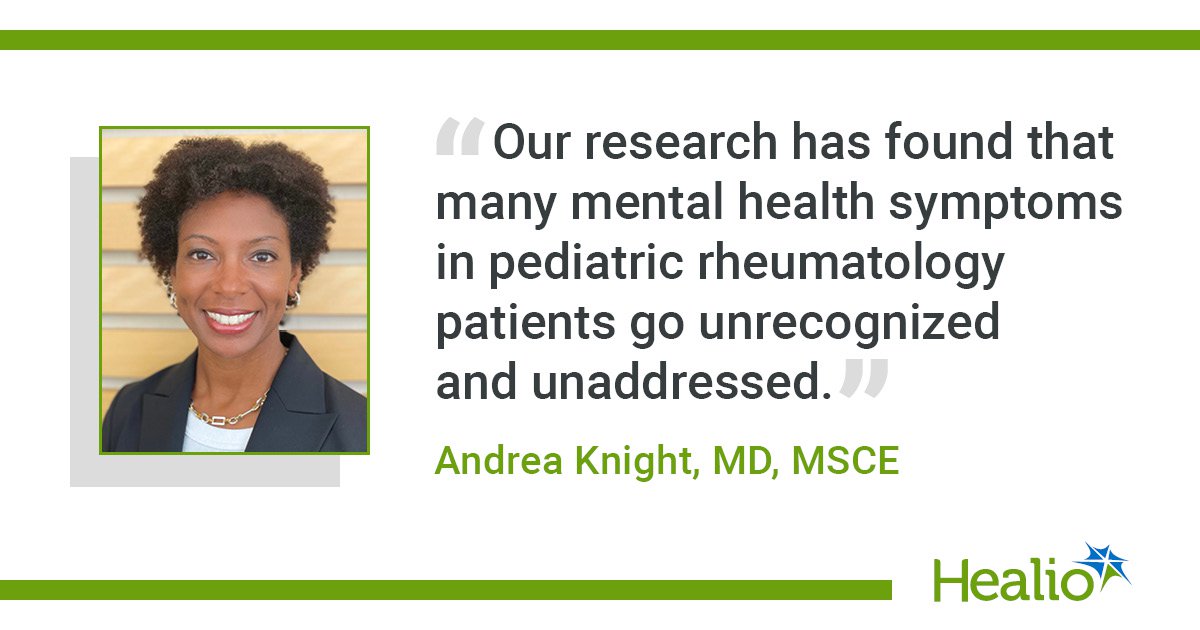August 20, 2025
7 min read
Key takeaways:
- Rheumatologists should be proactive in screening for mental health in their pediatric patients.
- ACR consensus statements also recommend collaborative management of mental health concerns, as well as mental health education for patients and parents.
Proactive screening and ongoing assessment are critical to mitigating mental health concerns in pediatric rheumatology patient populations, according to new consensus guidance statements from the American College of Rheumatology.
“We started working on this around 2019,” Andrea Knight, MD, MSCE, Canada research chair in mental health and chronic disease of childhood, and staff physician in the division of rheumatology, at the Hospital for Sick Children in Toronto, told Healio. “It took a while to make sure we had a good take on the relevant literature and to ensure our task force was representative of the provider and patient populations.

“We were intentional about drafting the statements in their initial forms,” she added. “Sending the drafts out for consensus took time. Going through the ACR review process took time. However, the surprise was that the timing worked out quite well, because mental health issues in general really came to the forefront in the pandemic. That helped set the stage for us to have a conversation about why this is particularly important for pediatric rheumatologists.”

Natoshia R. Cunningham
Knight and Natoshia R. Cunningham, PhD, associate professor in the College of Human Medicine, department of family medicine, at Michigan State University, and were part of the Childhood Arthritis and Rheumatology Research Alliance (CARRA) mental health guidance statement task force that authored the document, which was published in Arthritis Care & Research.
The task force included pediatric rheumatologists, pediatric behavioral health providers, patients and parents. The guidance development process included a literature review, a drafting of statements, an open comment period and, ultimately, review by the ACR Committee on Quality of Care.
After initially drafting 34 statements, the authors arrived at 11 statements that had at least 80% consensus among participating experts along with high empirical support.
Those statements recommend screening for mental health problems like anxiety and depression, collaborative management of symptoms with mental health specialists and/or primary care providers, and ongoing education for both patients and parents.
The aim, according to the authors, was to empower pediatric rheumatology providers to better address mental health concerns for patients.
Healio sat down with Cunningham and Knight to discuss the some of the most important statements, and why education on these topics is critical.
Healio: What are you hoping to accomplish by publishing this statement?
Cunningham: The main goal was to send a clear message: Managing mental health is important in pediatric rheumatology. We wanted clinicians to feel educated and empowered to tackle these issues.
We also hope to build infrastructure and resources to support patient mental health, because mental health is an important part of overall health. Also, because pediatric rheumatologists develop such trusting relationships with patients and their families, they are well poised to begin discussions and ask questions about mental health and help patients get connected with resources.
Knight: We did a survey of providers working with pediatric rheumatology patients — including rheumatologists, social workers and psychologists — in 2015 to 2016.
Our results showed that the majority of providers thought mental health was important, but, at that time, only 2% of those respondents were using validated tools in a systematic or routine way. There was a need for guidance for pediatric rheumatology providers to address mental health.
Healio: Has the situation changed since then?
Cunningham: We know rates of screening for mental health symptoms in pediatric rheumatology settings have increased. There has been positive momentum since that project was published, and we wanted to encourage others to build upon this progress. So, this set of recommendations is timely. It will help us build on that momentum not only to improve screening rates, but help providers know what to do once mental health issues have been identified. This could help providers take meaningful steps in mitigating these issues.
Healio: Was there anything remarkable about the literature review as you worked through the process of finding relevant data and studies?
Cunningham: Although we were aware of this given our own work, it may be surprising to providers, patients and families how common mental health problems are in pediatric rheumatology populations.
The second was how mental health symptoms can be linked to physical outcomes. Depression can be a symptom of lupus. Also, if a patient is depressed, they may not feel motivated to take their medications. This, of course, can lead to a worsening of their condition, and then more depression. We hope to break that cycle, to let providers know that addressing mental health issues can in turn improve physical health outcomes.
Healio: Why is screening for mental health outcomes so important?
Knight: Our research has found that many mental health symptoms in pediatric rheumatology patients go unrecognized and unaddressed. Proactive identification of symptoms is important to getting timely help and improving mental health outcomes, as well as overall health outcomes like medication adherence and disease control.
We recommend routine screening using validated measures at least once yearly for patients aged 12 years and older within a pediatric rheumatology setting, and ongoing reassessment of those with identified symptoms.
Although these statements are based on literature within the general pediatrics world, other statements take into account the nuances of rheumatologic conditions, such as additional screening close to diagnosis, during periods of increased disease activity and transition.
Healio: Another component of the document pertains to suicide and suicidal ideation in pediatric rheumatology populations. What is notable about this recommendation?
Cunningham: Suicidal ideation occurs in both healthy youth and in those with chronic illness, but it may not be top of mind for pediatric rheumatologists. We felt a culture shift was required for these physicians to recognize that suicidal thoughts can be part of the experience of living with a complex medical condition.
Taking care of these patients in a holistic way is so important. We wanted to stress that pediatric rheumatologists who elect to screen for depression should consider using a validated measure that specifically asks about suicidal ideation. However, it is not enough to just ask. You have to follow up. You have to provide resources and additional support. It has to happen with a trusted provider.
Sometimes providers are hesitant to ask these hard questions. However, we want to stress that even if you don’t ask, many patients are still having these thoughts. We recognize that this is uncomfortable. We have to do a better job at helping providers to be more comfortable with having these conversations.
Additional resources for training and education are important. When providers participate in these educational opportunities, they feel much more comfortable taking with patients about depression and assessing for risk related to suicidal thoughts.
Healio: One of the recommendations addresses mental health comorbidities in underrepresented populations. Could you talk about why this is important?
Knight: Minoritized populations — whether it is due to race, ethnicity, language or some other form of marginalization — are also at risk for mental health comorbidities. They face barriers to recognition of and access to care, whether it is due to language, culture, religious beliefs, provider bias or broader systemic biases.
Logistical barriers to care also exist, including lack of health insurance, challenges with traveling to see a provider or cost of copays. On the provider side, referrals or connection to services may fail to happen in minoritized populations for several reasons.
What we wanted to do was highlight challenges for these vulnerable populations who are not receiving timely diagnoses, not getting the kind of care they need for their condition, or not getting the kind of mental health support they need.
Healio: What are the different approaches for patients with mild vs. moderate or severe mental health symptoms?
Cunningham: A stratified approach can be helpful for thinking about people with different levels of mental health symptoms.
For patients with mild symptoms, it is important to intervene early before those symptoms develop into something more serious. Mild symptoms can be managed in partnership with a primary care provider, a community therapist or even a provider on the pediatric rheumatology team — such as a social worker — who can offer them basic strategies for preventing long-term problems going forward.
Patients with moderate or severe symptoms may require more intensive management by a mental health specialist, such as a psychologist or psychiatrist. Rheumatology providers really have an important responsibility in identifying and leveraging resources because they are trusted by their patients. We hope that they can build off that trust and encourage patients to engage in these resources.
Mental health complaints can be stigmatizing. Having a provider in your corner can help minimize that stigma.
Knight: We are trying to take a more proactive approach rather than a reactive approach. Families and providers can be blindsided when their child is admitted to a mental health facility because the severity of mental health symptoms was not recognized. Knowing that our patients are potentially at risk can help us be proactive about educating patients and families, and preventing severe outcomes and crises.
Healio: Another recommendation differentiates between mental health care and education in newly diagnosed vs. long-standing, established patients. Why did you make this distinction?
Knight: If we as their rheumatology providers are able to normalize and validate these common mental health challenges as part of their overall health care right at the time of diagnosis, it will go a long way in helping to stay ahead of them and manage them over time.
It is essential that patients and families have an awareness of anxiety, depression, stress, or worry as common emotions that should be addressed as part of their care, rather than a side issue not related to their condition.
Cunningham: For more established patients, it is important to continue to have conversations. Sometimes, immediately after a diagnosis, there is a “honeymoon” period, where patients and their families are very engaged about keeping the condition under control or in remission.
However, after a while, the reality of living with a chronic condition can set in, and this is when patients may be at increased risk for experiencing depression, anxiety or other mental health symptoms. We need to keep the conversation going to identify problems as they crop up.
Healio: What is the role of education in mitigating mental health outcomes?
Knight: To begin with, many patients and families experience anxiety, depression, worry or stress related to their diagnosis, but they do not know that this is common, and that there are evidence-based strategies to help.
Education is important and can take different forms. Web resources allow patients and families to digest the information on their own time. There are peer-to-peer groups where patients can learn about their diagnosis, challenges and coping strategies in a non-clinical setting. Webinars and workshops and in-person conferences held by patient organizations, where patients can sit in on sessions and learn about new research or approaches, can be also helpful.
More avenues of mental health care have developed in recent years, and they can make a difference in improving mental health outcomes, so we want our pediatric patients to know about them.
References:
Cunningham NR, et al. Arth Care & Res. 2025;doi:10.1002/acr.25519.
For more information:
Healio Rheumatology can be reached at rheumatology@healio.com.










